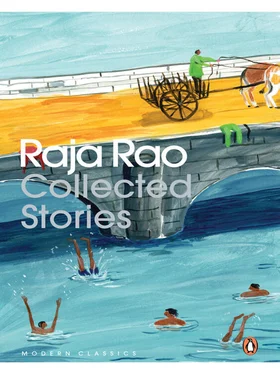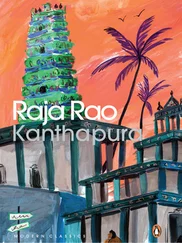Raja Rao - Collected Stories
Здесь есть возможность читать онлайн «Raja Rao - Collected Stories» весь текст электронной книги совершенно бесплатно (целиком полную версию без сокращений). В некоторых случаях можно слушать аудио, скачать через торрент в формате fb2 и присутствует краткое содержание. Год выпуска: 2014, Издательство: Penguin, Жанр: Классическая проза, на английском языке. Описание произведения, (предисловие) а так же отзывы посетителей доступны на портале библиотеки ЛибКат.
- Название:Collected Stories
- Автор:
- Издательство:Penguin
- Жанр:
- Год:2014
- ISBN:нет данных
- Рейтинг книги:5 / 5. Голосов: 1
-
Избранное:Добавить в избранное
- Отзывы:
-
Ваша оценка:
- 100
- 1
- 2
- 3
- 4
- 5
Collected Stories: краткое содержание, описание и аннотация
Предлагаем к чтению аннотацию, описание, краткое содержание или предисловие (зависит от того, что написал сам автор книги «Collected Stories»). Если вы не нашли необходимую информацию о книге — напишите в комментариях, мы постараемся отыскать её.
Collected Stories — читать онлайн бесплатно полную книгу (весь текст) целиком
Ниже представлен текст книги, разбитый по страницам. Система сохранения места последней прочитанной страницы, позволяет с удобством читать онлайн бесплатно книгу «Collected Stories», без необходимости каждый раз заново искать на чём Вы остановились. Поставьте закладку, и сможете в любой момент перейти на страницу, на которой закончили чтение.
Интервал:
Закладка:
Takkatakka takka
My love is like a twisting creeper and there she goes twisting her waist, and showing her ripe breasts
My love is cool like honey
My love takes me where no light goeth (But to where all love is — and here she gives a long wink)
My love is tender as betel
My love stays where I move,
And moves when I stay.
Shiv learnt some of these songs too. And he became such a raresome success, that other women said: ‘Shiv, if you came to me, you could have 10 per cent of it.’ Others came — but one fat Punjabi bitch said: ‘You stay here and take all the money. You are the lord, and I the slave.’ And Shiv somehow fell to the fat bitch. He brought her men, and juicy big men, too, and she enjoyed them, and they enjoyed her, and money just flowed into the house, as never it had. Shiv forgot his tiger and the cubs. He was better off now than in Vallabhpur. That wretched uncle might have mills and cars, but here Shiv is no poor hanger-on. Policemen visit him (to have access to pleasure or money) and sometimes even politicians. There was one big politician, who in his hurry, forgot his Gandhicap in the house. Shiv now put this headgear on and he looked ever more respectable. The Gandhi-cap gives you such respect that you could go anywhere, and nobody will say one harsh word to you. It also made contact easier. A Gandhi-cap trusts another Gandhi-cap. And when two Gandhi-caps meet there’s much greater fun. Life is not worth living now, I tell you, unless you speak the Mahatma’s tongue. Of course the British have left, that was so long ago. They left, and we have Swaraj. But this juice of woman, what could life be without it. Hé, what do you say to that, Shiv?
‘A woman’s juice,’ quoted Shiv, ‘is like a river that stays.’
‘You’re a wonderful man. Where do you come from?’
‘From Bombay,’ lied Shiv. He hated to speak of Vallabhpur and the Eight-pillared House. ‘In Bombay I learnt all the tricks native and foreign. Yes,’ continued Shiv, ‘and the white woman has no juice. Did you know that?’
‘How so, mosquito mite?’
‘Why, how can there be juice where there’s neither the smell of turmeric nor of the civet bone. The woman’s treasure is in studied smells,’ he said and rolled his eyes in such mischief, the Gandhi-cap just followed him.
The fact however is: Shiv had never touched a woman. Evil though the Sadhu was he’d given Shiv a mantra. The repeating of it was simple. It gave him power over desire. He also sang hymns morning and evening — the Kalabhairava stotra, the Chandi stotra, etc., etc. It made every woman seem so like a mother, all women were creatures rising out of the lotus stalk, wearing garlands round their necks, crowned with celestial diadems, chanting sweet hymns. ‘A woman is beauty,’ he said. ‘A woman is creation. A woman is sister. A woman is mother. I worship all women.’ That’s how Shiv felt. He made money, and much money. And this went on for many years. He kept it in a tight heavy trunk of steel he’d bought in the bazaar. And whenever he’d time he’d slip into the Annapurna temple, and sit in prayer. He prayed that he be kept pure. And he went far and deep into himself, but he knew not where. And coming back he’d bring a client for Nanna, for that was the fat Punjabi bitch’s name. She was so good, she was always smiling, and so virtuous. She was kind to the poor, she was friendly to the rich. For her money was important. Yet so was the satisfaction she gave man. She wanted no false money. Every man she satisfied God would remember, and she would have that much credit in her next life. Shiv respected her. After all she was born a concubine and she performed what she was born to: her dharma. An ass’s son is an ass, a buffalo’s son is a he-buffalo. What was wrong about it anyway. Take the name of Shiva or Rama and sing hymns. Truth is only in the holy name. That’s the only truth which is truth.
One day Nanna said: I hear you muttering a mantra all the time, why don’t you teach me one? ‘It’s a Sadhu who gave it to me,’ explained Shiv, moved by the woman’s big heart. Sincerity is not given to everyone, you know. And she insisted — and she persisted. ‘Oh, son, give me that mantra of yours? Please, please.’ So Shiv went back to the Ganga ghat, after these many years, and of course there he was our Sadhu, as full of fun, of bhang and abuse. ‘Nice son of a widow, to leave me in the wedge, you donkey’s son,’ and he swished his trident towards Shiv. Shiv slipped and ran and laughed. And the Sadhu and Shiv pursued each other like boys, at the hoothooth game. Hoothoothu, hoothhoothu, hut! But Shiv was so agile, though now a man, for the Sadhu to catch. Even the monkeys on the railings scratched their bellies, and seemed to enjoy this spectacle. When the Sadhu was out of breath, he said: ‘Stay.’ And Shivlal stayed. He made the hookah and filled it with chillum, the Sadhu had never had a better smoke. You could see from Shiv’s fresh face that he had not forgotten his mantra. That works, you know.
The woman now came in search of Shiv. Whensoever anyone disappears in Benares you always find him or her with a Sadhu. And a good woman has quick intuition. Nanna found him with the Sadhu and said: ‘Little big brother, you’ve abandoned me.’ ‘No,’ said Shiv, ‘you wanted a mantra. I came in search of my Sadhu. He gave it to me. Take it from him.’ The Sadhu never said a word. He put his tongs in his burning fire, and looked at it several times, as if he were going to brand her. ‘A woman who sells her body,’ said the Sadhu, ‘is like the crow that lives on funerals. Both live on bodies. Woman do you see that pyre, there? That’s the end to this pus and bone booby, a booby doll,’ he said, and showed his own healthy body. ‘Maharaj,’ she begged and fell at his feet, ‘give me a mantra.’
‘Come on the fourth day of ashad . Fast three days before that. Come without having spoken to anyone. Come and we’ll see.’ And she was so grandly pleased she rushed to a sweetmeat shop, and bought back some pedas, and a few garlands from the flower sellers. The Sadhu tore the garland and threw the flowers into the river, giving away the pedas to the monkeys. He gave one piece of peda however to the woman, with a look of contempt and harshness, but she looked as if she’d been given royal gold. ‘Your trunk is where it is?’ she said, did Nanna to Shiv. ‘No one will touch it. But since you’ve gone the business is slack.’ The Sadhu said to Shiv: ‘Go and help her.’ And Shiv wondered at this. Shiv still wonders.
He went every morning to the Sadhu and cleaned the ghats and cooked the meals, and after his own bath and meal he went off to Nanna for the afternoons. The Pakistani refugees too came to Benares, and for some reason they always seem rich. When they came it was fun, they were so jolly.
The money in the steel trunk must have been big, big. ‘What will you do with all that money?’ Nanna asked Shiv once. Shiv laughed and said, ‘Oh, I’ll go back and buy my Uncle’s house, and his mills, and buy myself a wife.’ ‘Oh,’ says Nanna, ‘you will never leave your Nanna, as you’ll never leave your Sadhu.’ But when one talks of money Shivlal seemed so self-absorbed, as if he were calculating. But one day he took the trunk to the Ganga ghat. He left it under the tree, by the Sadhu, and did not care. And on Divali night when the lights were all ablaze, and all Benares looked as if the city were seen in a dream, he opened up the trunk and started tearing the notes one by one carefully, piling pieces on a side, as if he were tearing splinters from a firewood. The Sadhu coming back from his intestinal duties saw this. He too joined this festival. He took every note and blew at it as if to purify it, and tore it all into more pieces than had done Shiv. The Sadhu now went down to have a bath in the Ganges, and still Shiv was doing the job. The Sadhu joined him again. By now people had gathered round them. Who can do anything in Benares that all do not want to see? If no one sees, the monkeys are there to see, always. The monkeys too got intrigued. This young man is playing some trick (for you may not have heard the Benares monkeys know as much as you do of the smell of money).
Читать дальшеИнтервал:
Закладка:
Похожие книги на «Collected Stories»
Представляем Вашему вниманию похожие книги на «Collected Stories» списком для выбора. Мы отобрали схожую по названию и смыслу литературу в надежде предоставить читателям больше вариантов отыскать новые, интересные, ещё непрочитанные произведения.
Обсуждение, отзывы о книге «Collected Stories» и просто собственные мнения читателей. Оставьте ваши комментарии, напишите, что Вы думаете о произведении, его смысле или главных героях. Укажите что конкретно понравилось, а что нет, и почему Вы так считаете.












